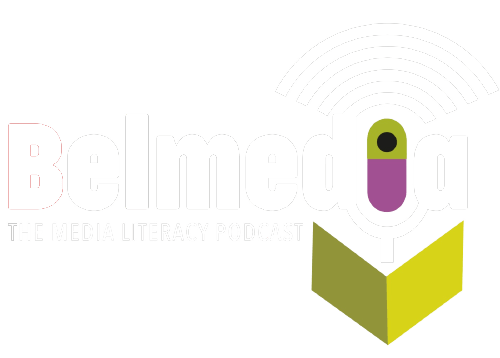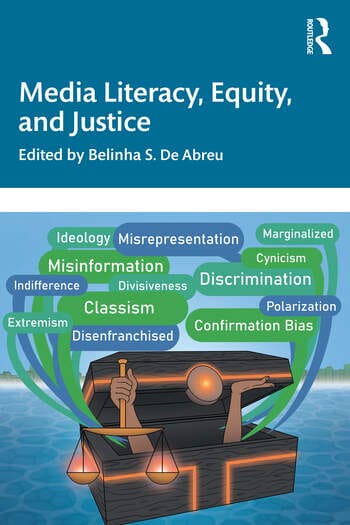
Media Literacy, Equity, and Justice
Editor: Belinha S. De Abreu
Year: 2023
Summary:
Offering a new and thought-provoking look at media literacy education, this book brings together a range of perspectives that address the past, present, and future of media literacy, equity and justice. Straddling media studies, literacy education, and social justice education, this book comes at a time when the media’s role as well as our media intake and perceptions are being disrupted. As a result, questions of censorship, free speech, accountability abound, and nuance is often lost. This book is an antidote to the challenges facing media literacy education: chapters offer a careful examination of important and hot topics, including AI, authenticity, representation, climate change, activism and more.
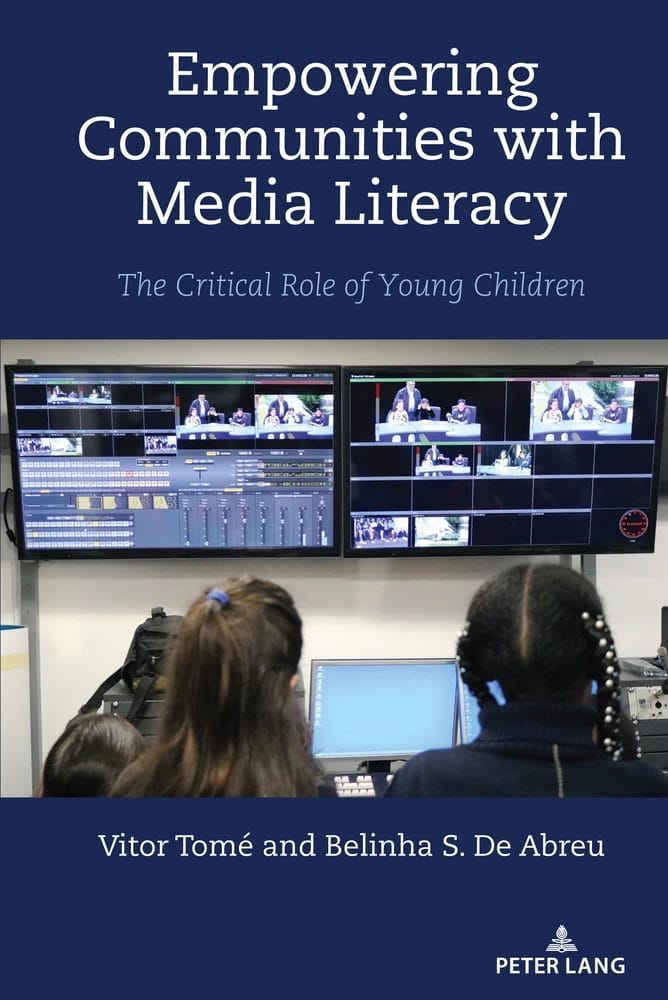
Empowering Communities with Media Literacy: The Critical Role of Young Children
Authors: Vitor Tomé and Belinha S. De Abreu
Year: 2023
Summary:
This book details the project “Digital Citizenship Education for Democratic Participation” involving approximately 400 pre-school and primary school children, their families, teachers, and community members in a Lisbon locality. The research presented aims to answer the following question: To what extent can a local (and replicable) digital media literacy program empower preschool and primary-school-aged children to become active and effective citizens in the digital era? Through this book, the authors share the steps taken during the project, including the main difficulties faced and the solutions found to overcome them as well as the project’s sustainability.
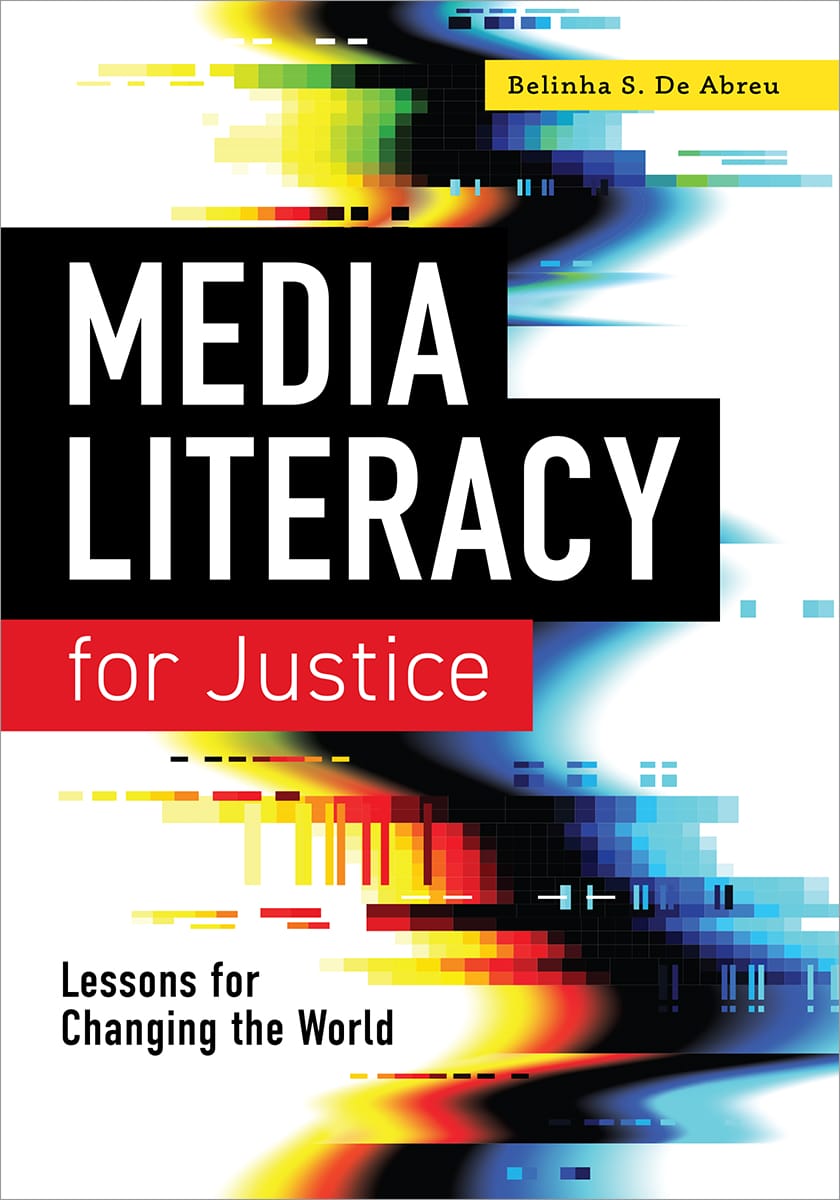
Media Literacy for Justice: Lessons for Changing the World
Author: Belinha S. De Abreu
Year: 2022
Summary:
Providing context, reflection points, and ready-to-use lesson plans, this powerful book illuminates the intersections of social justice and media literacy for educators, school and public librarians, teachers of history and civics, information literacy instructors, and community leaders. De Abreu and her fellow contributors propose that a key solution to our society’s crisis of misinformation, misrepresentation, and misunderstanding lies in melding social justice aims with media literacy concepts and skills. This book features reflective activities and lesson ideas that can be adapted for educational settings from higher education to the K-12 spectrum, community centers, and libraries.

Teaching Media Literacy
Author: Belinha S. De Abreu
Year: 2019
Summary:
Though media literacy and information literacy are intertwined, there are important differences; and there has never been a more urgent need for an incisive examination of the crucial role librarians and other educators can play in teaching the skills necessary to access, analyze, evaluate, and create media. Media literate youth and adults are better able to understand the complex messages emanating from television, movies, radio, the internet, news outlets, magazines, books, billboards, video games, music, and all other forms of media. In this book, international expert De Abreu melds advice from a diverse array of practitioners and subject experts with her own research findings to examine how consuming media and technology impacts the learning of K–12 students.

International Handbook of Media Literacy Education
Editors: Belinha S. De Abreu, Paul Mihailidis, Alice Y.L. Lee, Jad Melki, Julian McDougall
Year: 2017
Summary:
At the forefront in its field, this Handbook examines the theoretical, conceptual, pedagogical and methodological development of media literacy education and research around the world. Building on traditional media literacy frameworks in critical analysis, evaluation, and assessment, it incorporates new literacies emerging around connective technologies, mobile platforms, and social networks. A global perspective rather than a Western-centric point of view is explicitly highlighted, with contributors from all continents, to show the empirical research being done at the intersection of media, education, and engagement in daily life. Structured around five themes―Educational Interventions; Safeguarding/Data and Online Privacy; Engagement in Civic Life; Media, Creativity and Production; Digital Media Literacy―the volume as a whole emphasizes the competencies needed to engage in meaningful participation in digital culture.
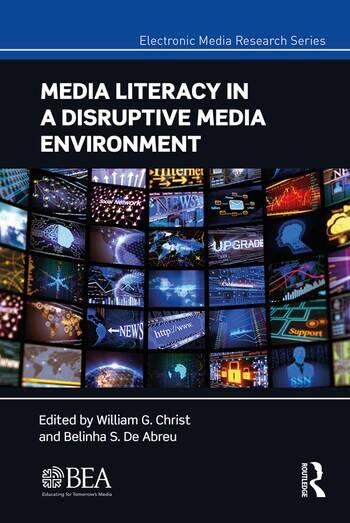
Media Literacy in a Disruptive Media Environment
Editors: William G. Christ and Belinha S. De Abreu
Year: 2020
Summary:
This book, part of the BEA Electronic Media Research Series, brings together top scholars researching media literacy and lays out the current state of the field in areas such as propaganda, news, participatory culture, representation, education, social/environmental justice, and civic engagement. The field of media literacy continues to undergo changes and challenges as audiences are reconceptualized and reconfigured, media industries are transformed and replaced, and the production of media texts is available to anyone with a smartphone. The book provides an overview of these. It offers readers specific examples and recommendations to help others as they develop their own teaching and research agendas. Media Literacy in a Disruptive Media Environment will be of great interest to scholars and graduate students studying media literacy through the lens of broadcasting, communication studies, media and cultural studies, film, and digital media studies.

Global Media Literacy in a Digital Age: Teaching Beyond Borders
Editors: Belinha S. De Abreu and Melda N. Yildiz
Year: 2015
Summary:
How do we connect with one another? How do the media portray different cultures and beliefs? What messages are often omitted from media? How do we connect what we see in the worldwide media to the classroom? This book, divided into four parts, serves to answer many of these questions. In Part 1, readers are provided with a historical look at media literacy education while glimpsing the future of this educational movement. Part 2 curates voices from around the globe, from practitioners to researchers, who provide a look at issues that are of consequence in our worldwide society. Part 3 focuses on education through cases studies that give educational perspectives and assessment opportunities. The final section, «Take Action,» offers the reader resources for growing global media literacy around the world. This timely resource provides a look at how media literacy education has become a global and interconnected dialogue brought about by the evolution of technology.
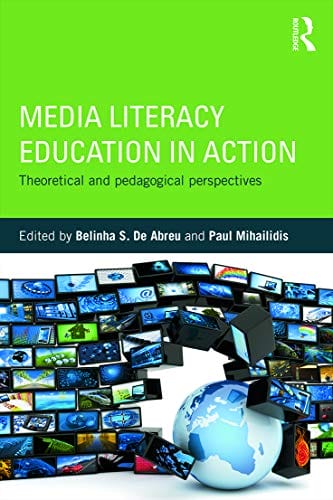
Media Literacy Education in Action: Theoretical and Pedagogical Perspectives
Editors: Belinha S. De Abreu and Paul Mihailidis
Year: 2013
Summary:
Media Literacy Education in Action brings together the field’s leading scholars and advocates to present a snapshot of the theoretical and conceptual development of media literacy education―what has influenced it, current trends, and ideas about its future. Featuring a mix of perspectives, it explores the divergent ways in which media literacy is connected to educational communities and academic areas in both local and global contexts. Compelling, well-organized, and authoritative, this one-stop resource for understanding more about media literacy education across disciplines, cultures, and divides offers the fresh outlook that is needed at this point in time. Globally, as more and more states and countries call for media literacy education more explicitly in their curriculum guidelines, educators are being required to teach media literacy in both elementary and secondary education contexts.
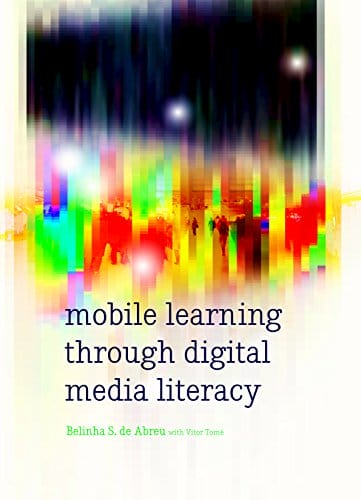
Mobile Learning through Digital Media Literacy
Author: Belinha S. De Abreu with Vitor Tomé
Year: 2017
Summary:
Mobile Learning through Digital Media Literacy proposes media literacy education as a conceptual framework for bridging mobile technologies in teaching and learning. As cell phones have become more advanced and applications more innovative and fitting, candid conversations are taking place as to how technology can be a purposeful tool in the classroom. Mobile technology already attracts students and encourages text-language development; yet its accessibility affords the potential for more extended use, offering enhancement and flexibility for instructional development. In light of a shared vision of collaboration and growth developing globally within educational circles, this book examines mobile learning as a formal literacy, as a productivity environment for creative growth in and out of the classroom, and as an advancement to social learning through online networks. The book surveys media literacy education―both within the classroom and its extended implications―for concerns of civic participation and data privacy, as more educators and policymakers internationally consider the possibilities of connected classrooms and m-learning on a universal scale.
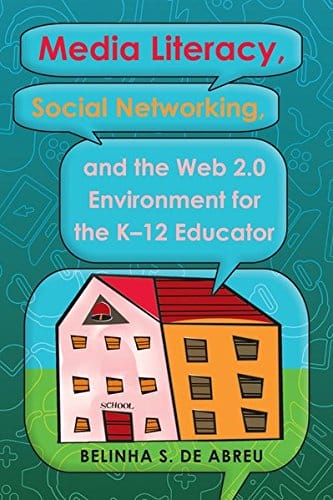
Media Literacy, Social Networking, and the Web 2.0 Environment for the K-12 Educator
Author: Belinha S. De Abreu
Year: 2011
Summary:
This book, a resource for educators, uses the theme of media literacy as a lens through which to view and discuss social networking and Web 2.0 environments. There is ongoing and positive research on the participatory culture created by youth who are heavily involved in the new digital technologies, yet schools tend to avoid these mediums for fear of the unknown. Can students learn within this context? This book posits that indeed they can, using media literacy as a way to provide a framework for these mediated environments. The book serves as a forum for educators and those interested in the field of media literacy, digital, and social technologies, who seek to bridge curriculum connections as well as understand the online culture of students.

